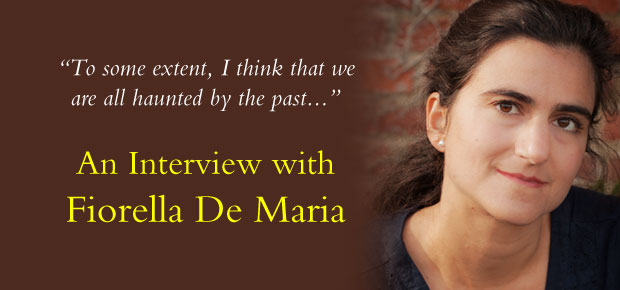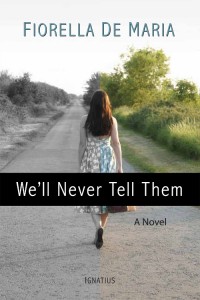
Fiorella De Maria is a novelist as well as an advocate for pro-life causes. Her novels include Poor Banished Children, Do No Harm, and her latest, We’ll Never Tell Them. She will be speaking in San Francisco later this month at the annual conference of the California Association Natural Family Planning as well as in other Bay Area locations. Ignatius Press Novels spoke with her via e-mail. You can also read a Catholic World Report interview with her about her pro-life work.
 The three novels you’ve had published by Ignatius Press are quite different; Poor Banished Children is historical fiction set in the seventeenth-century, Do No Harm is a legal thriller, and We’ll Never Tell Them is a novel which looks in two directions at the same time: back into history and forward into the modern day. But if I had to pinpoint something which ties them all together I think it would be this: all of the protagonists are haunted by the past—sometimes even by actions which took place before their birth. And in grappling with the past, they find a way to look ahead or to make sense of their lives in the here and now. Why do you think this theme is of such importance?
The three novels you’ve had published by Ignatius Press are quite different; Poor Banished Children is historical fiction set in the seventeenth-century, Do No Harm is a legal thriller, and We’ll Never Tell Them is a novel which looks in two directions at the same time: back into history and forward into the modern day. But if I had to pinpoint something which ties them all together I think it would be this: all of the protagonists are haunted by the past—sometimes even by actions which took place before their birth. And in grappling with the past, they find a way to look ahead or to make sense of their lives in the here and now. Why do you think this theme is of such importance?
De Maria: To some extent, I think that we are all haunted by the past, by our personal and family backgrounds but also by our national and cultural histories. I am certainly very proud to come from a tiny island which stood up to the might of the Nazi aggression and I grew up with a very strong sense of the need to stand firm against injustice, even against terrifying odds, but I also feel very humbled by the sacrifices past generations chose to make. Without wishing to sound melodramatic, I want to be worthy of my ancestry and all my characters in some way or another – including the quintessentially English Matthew Kemble [ed. note: character in Do No Harm] – feel accountable to their forefathers. In the end, every human being has to grapple with the transience of their own existence in the context of millions of years of human history and when we are haunted by the past, we are also in some ways haunted by our own mortality.
Both Poor Banished Children and We’ll Never Tell Them are about women from Malta. You are of Maltese heritage yourself. How has that heritage played into your writing?
De Maria: My writing always seems to take me back to the streets of Malta! The settings of my books tend to be either England, particularly the West Country where I grew up, or Malta but I keep finding myself returning to Malta even sometimes without intending to. The Maltese equivalent of “home is where the heart is” sounds odd in English, “where the heart lies the legs will follow” but it gives some sense of constantly being drawn back to somewhere you love. My father was a history teacher years ago, so I spent many happy childhood hours hearing his stories about Maltese history (some of them pretty gory!) and walking around Neolithic temples and museums. My Nanna (God rest her soul) was a wonderful storyteller and she could bring her own past to life so vividly, it really was as though she were taking me by the hand and guiding me back to her childhood in America and her youth in wartime Malta. So I suppose it was inevitable that I would keep revisiting those stories in my own writing.
We’ll Never Tell Them seems to start off in one direction—I thought it was going to be a romance—but then becomes something else: a portrait of how personal connection and the sharing of history can affect lives. Do you think attempts to forget or whitewash history are dangerous?
De Maria: Absolutely. The saying, “those who do not remember the past are condemned to repeat it” is attributed to a number of people and I have always believed it to be true. I also do not believe that it is possible to understand the world we live in without having good knowledge of the historical events that brought us to where we are. I am finding it particularly heartbreaking to watch the terrible events unfolding in the Middle East as we speak. Poor Banished Children explored the horrors facing Christian women sold into slavery by the Barbary pirates four hundred years ago, but today Christian and Yazidi girls are being sold into the same horrific slavery, facing the same cruelty that women endured in the seventeenth century. It hardly bears thinking about.
However, when it comes to remembering the lessons of history, I am also aware that there is an ongoing debate among historians as to precisely what a “true” account of the past really is. We always remember the past through the filter of our own experience and one of the tasks of a writer of historical fiction is to try to peel away the many layers of interpretation and to recreate the past as faithfully as possible, without allowing one’s own prejudices to cloud the lens too much. Not an easy task at the best of times.
Another thing that ties together Poor Banished Children and We’ll Never Tell Them is how men and women react to trauma and suffering. Oftentimes we Catholics can give in to a somewhat sentimental idea of suffering, offering glib platitudes about how the suffering person should just “offer it up” without acknowledging how deeply trauma can affect and change a person. Do you hope your books can give readers some insight into this aspect of suffering?
De Maria: It’s an interesting point and I do think we have a tendency to sentimentalise or trivialise suffering, but that is not really an authentically Catholic position. I remember reading a pastor’s reflections about what he termed the “bumper sticker theology” approach to suffering which completely ignores the raw agony a person may be going through by offering them trite sayings that are almost insulting, “God never gives you a cross you cannot carry” – really? “Death is nothing at all” – come on now, whatever death is, it is most definitely something. As Catholics, with our understanding of the redemptive suffering of Christ and the need – indeed the opportunity – to unite our own sufferings with the suffering of Christ, we should never fall for the illusion that suffering is a trivial matter.
Having a witnessed a great deal of suffering in my life, I am painfully aware of how much suffering can damage and corrupt a person if they do not receive the spiritual support and guidance they need. Trauma can strengthen in the long run but the etymology of the word is literally “wound” or “defeat” and it can provoke fear, bitterness, misdirected hatred, a loss of purpose or self-respect, it can lead to mental breakdown, despair and even suicide – no more so than if the person is left to struggle alone. The theme of suffering is central to all my books and I do hope that by exploring the ways in which trauma can change a person, it may make it easier to reach out to those who have been broken by suffering.
In the historical portions of We’ll Never Tell Them, we see a young girl who has endured a great deal of hardship and cruelty. But the reaction to this from people around her is always to make choices for her, to try to “fix” things by determining her fate instead of giving her the chance to make choices of her own. This often seems to be the way the powerful attempt to help the weak. What do you think drives this urge?
De Maria: Ironically, as Leo attempts to explain to an indignant Kristjana, the people around Lily who keep trying to help her by taking control of her life would not have questioned the legitimacy of the way they behaved at the time. In a paternalistic society like that, it simply would not have occurred to the authority figures in the story to ask a child’s opinion – the feeling would have been much more along the lines of “we know what’s good for you” and “you’ll thank us for this one day.” One of the reasons I write about it in We’ll Never Tell Them is that that attitude was still quite prevalent in my culture right the way through my own childhood and has only just started to change. It also manifests itself more subtly in the way we treat poorer countries, for example. There is a neo-colonial attitude in the way western governments decide what developing countries need without necessarily asking the opinions of people on the ground, or the way we seek to impose western values on other cultures on the assumption that western family structures, for example, are self-evidently superior. I think a lot of the urge to take control like that when a person is in a needy or vulnerable position is well-intentioned but there is an arrogance to it that needs to be confronted.
World War I, the “War to End All Wars”, looms large in this novel. There have been various literary critics, such as Paul Fussell in his The Great War and Modern Memory, who see this event as instigating a decisive break from traditional mores to a modern, more cynical view of mankind. How do you view the impact of the WWI on Western culture?
De Maria: I think the First World War certainly marked a watershed for western society and it did so for a number of reasons. It marked the beginnings of horrors such as the use of poison gas as a means of mass killing and the aerial bombing of civilians that became commonplace during the Second World War, but also social changes such as large numbers of women going into the workplace and millions of women left unable to marry after the war. However, wars are by definition bloody and traumatic, every war to some extent will be a watershed or flashpoint moment for the nations involved; social structures will break down, families will be separated because of men going away to fight, the innocent will get caught in the crossfire and the survivors will have to come to terms with the aftermath. My feeling is that the Second World War had a much more devastating impact, but the question of the full significance of the First World War will be debated for many decades to come.
Thanks for speaking to us! One last question: are you working on any other novels?
De Maria: I am indeed working on another novel at the moment and I have a couple more plans in the pipeline. All I can say is that my guilty little hobby is detective fiction – Sherlock Holmes, Poirot, Miss Marple, Morse, Lewis, Fr Brown, Fr Dowling, Foyle, Adam Dalgleish, Jonathan Creek – I love reading and watching crime drama. so my next book may involve the odd mysterious corpse or two…






James Casper
August 13, 2015 at 1:12 pm
There is a tradition here: One of the foremost British abortion opponents of an earlier era was Elizabeth Anscombe, a conservative Catholic regarded by many as the greatest female philosopher of the twentieth century. Anscombe teamed up with a mutual friend, the late Professor of Philosophy John Dolan (University of Minnesota) and South African the late Dr. Hymie Gordon ( Mayo Clinic) to form and conduct the Program in Human Rights at the University of Minnesota. With the three of them in the same room, one was in the immediate company of possibly the most formidably intellectual and philosophical opponents of abortion. Professor Dolan provided inspiration and background in medical ethics; Anscombe the ‘wrecking ball’ analysis that demolished C. S. Lewis in a legendary debate; and Hymie Gordon the experience of a lifelong medical practitioner. Gordon, who had provided medical assistance to thousands of women and delivered thousands of babies, once said, “I never had a woman ask me, ‘Doctor, how is my fetus doing?”” Dumbstruck and tongue-tied in such company, I once spent an evening with Anscombe at Professor Dolan’s home in Minneapolis, and had an opportunity to do an independent study of Ludwig Wittgenstein supervised by the Anscombe, Wittgenstein’s student protégé and biographer. This was a great honor but well beyond me, as C. S. Lewis had found out much earlier. Like Lewis, I turned to fiction-writing. Alas, these three pro-life giants are no longer with us, but it is good to see Fiorella de Maria and a new generation filling the ranks. She probably was not yet born when I sputtered my way, quite over my head in such company. To judge from her excellent novels, I wish she had been there. I also wish Notre Dame Professor Dr. Gary Gutting, a former classmate at Saint Louis University, had been there, but that is quite another story!
A Comment on Fiorella De Maria’s Interview | James Casper
August 13, 2015 at 10:11 pm
[…] at IP Novels regarding novelist Fiorella De […]